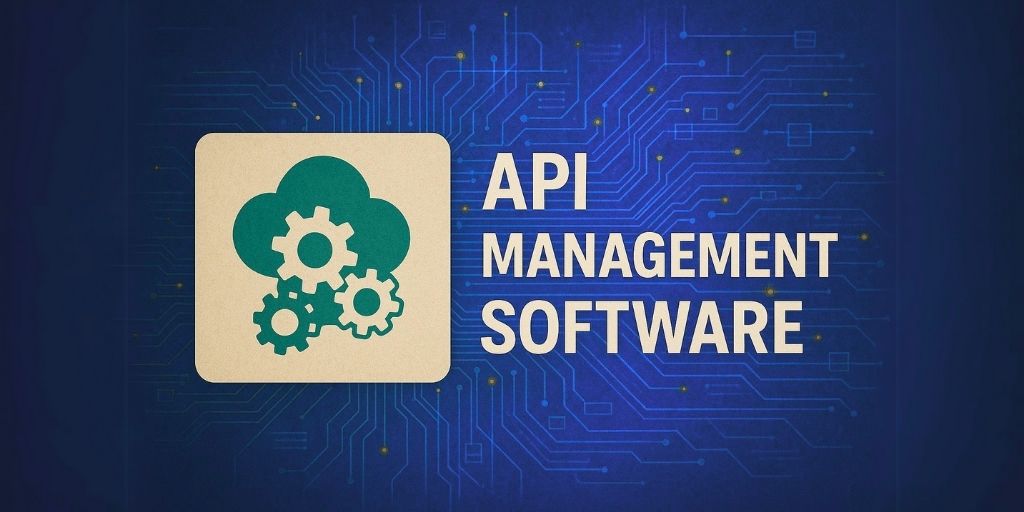In today’s digital ecosystem, businesses are increasingly dependent on interconnected services and applications to fulfill the demands of customers and ease day-to-day operations. At the center of this interconnected web are APIs (Application Programming Interfaces), which are communication channels between the different software systems. As the organizations grow their digital footprint, the number of APIs they deal with grows, at some exponential rate, in tandem, posing a serious problem in governance, security, and scalability. This is where API management software comes into its own.
An optimal API management software is what equips organizations with the tools to design, build, deploy, analyze, and secure APIs throughout their lifecycle. Such platforms help businesses monetize innovation and make digital assets available with a seamless experience for both internal as well as external consumers. By using an apt API management software, companies can truly transform their digital offerings, speed up their development cycles, and respond faster to changes in the market.
As digital transformation initiatives pick up pace across industries in 2025, selecting the right API management solution has indeed become a strategic decision that would provide a competitive advantage to an organization. This article discusses the top 10 API management platforms available today, their key features, and major considerations to guide you toward the right choice for your business needs.
What is API Management Software?
API management software entails all of the broad-ranging solutions that are designed to accommodate the entire lifecycle of an API, from design, publication, governance, and monitoring. These platforms act as the primary interface for an organization’s API ecosystem and provide the infrastructure needed to manage internal and external APIs efficiently.
At the simplest level, the setup usually includes API gateways that route and secure APIs, developer portals for API discovery and easy onboarding, analytics dashboards that capture and evaluate API use, and policy enforcement tools to guarantee compliance with company standards. Modern API management software may also provide API design and testing tools, version control, and monetization features to help an organization generate revenue from its APIs.
Why do we need API Management Software?
- Security: API management solutions have powerful methods for authentication, authorization, and encryption of any sensitive data that crosses APIs. They provide threat detection facilities, rate-limiting facilities, and policy enforcement facilities to prevent the intrusion of attack, injection, DDoS, and unauthorized access, hence protecting your organization’s digital assets and building trust with the clients.
- Visibility: These platforms allow for a lot of monitoring and analytics, meaning that companies can see in real time how their API performs, deduce the patterns of usage, and find the bottlenecks. Transparency helps organizations to swiftly detect problems, maximize resources, and take action based on data-driven arguments about priority for API development and funds allocation for infrastructure.
- Scalability: API management software can handle flood volumes, allowing real growth organizations without a loss of performance. By means of load balancing, caching mechanisms, and traffic management capabilities, the solution achieves maximum operation regardless of the times of high volume usage, thus sustaining business growth without the impacts of proportional infrastructure expenses.
- Governance: API management platforms make it possible to create a uniform standard for the API portfolio of an organisation regarding versioning and documentation. This governance framework guarantees the APIs are in line with policies in the company, as well as regulatory and industry best practices, while limiting technical debts and simplifying the measures of a distributed team.
Comparison Table for API Management Software
| Software | Rating | Competitive Edge |
| Integrate.io | 4.3/5 | Superior data mesh capabilities with exceptional customer support through dedicated engineers |
| MuleSoft | 4.4/5 | Comprehensive microservices support through advanced service mesh architecture |
| IBM API Connect | 4.6/5 | Enterprise-grade security with unmatched governance capabilities |
| Jitterbit | 4.6/5 | Most intuitive visual interface for rapid API development by non-specialists |
| Microsoft Azure API Management | 4.2/5 | Seamless integration with the Azure ecosystem and advanced transformation capabilities |
| Workato | 4.7/5 | Most comprehensive API dashboard with superior customization options |
| SAP Integration Suite | 4.3/5 | Best real-time processing for enterprise-scale operations |
| Postman | 4.6/5 | Most complete testing tools combined with extensive documentation features |
| Apigee | 4.4/5 | Native Google Cloud integration with superior analytics capabilities |
| SwaggerHub | 4.5/5 | Most standards-compliant API design with best-in-class OpenAPI implementation |
Top 10 API Management Software
1. Integrate.io
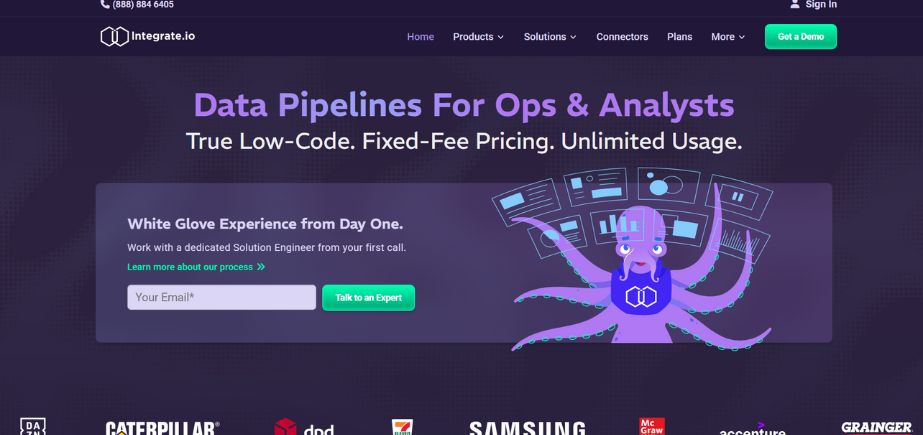
Type: Cloud-based data integration platform with API management
Website: https://www.integrate.io
Integrate.io provides a complete solution for API management, and it has an emphasis on simplifying data integration issues while ensuring powerful API functionality. The platform is strong at converting complex data operations into a standard workflow by auto-generating an API and having customization capabilities. What is distinctive about Integrate.io is its style of combining the data pipeline capabilities with those of API management.
There is a unified context where organizations can work with their data (processing it) and expose it with an easy-to-manage collection of interfaces. The strength of the platform is in the functionality that allows for keeping data quality at all levels of the pipeline and offers flexible authentication possibilities and scripting capabilities at the same time. When providing support, Integrate.io makes sure to have a dedicated support engineer for every client to ensure a hassle-free implementation process, which helps in accelerating time-to-value for any size of organization.
Key Features
- Automated API generation
- Custom scripting capabilities
- Advanced authentication options
- Data mesh architecture
- Comprehensive monitoring tools
Pros
- Dedicated support engineers
- Exceptional data quality
- Flexible scaling options
Cons
- Complex pricing structure
- Steeper learning curve
- Limited community resources
Pricing
Custom pricing based on usage volume and selected features.
2. MuleSoft
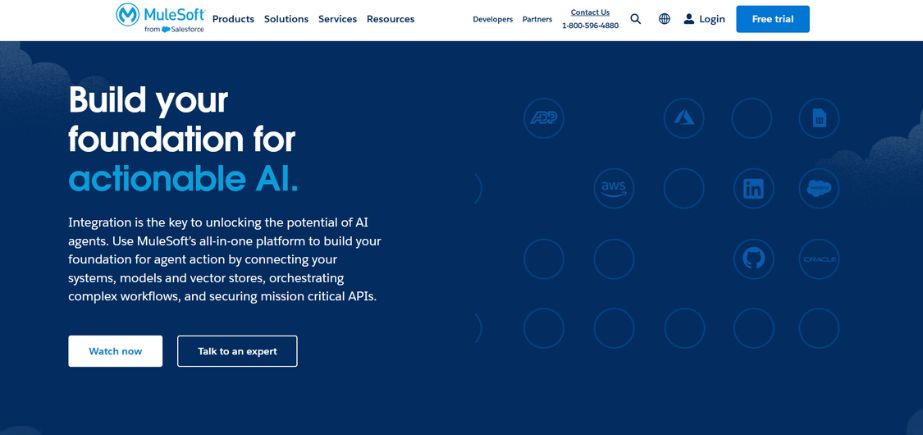
Type: Enterprise integration platform with API management
Rating: 4.4/5
Website: https://www.mulesoft.com
What MuleSoft offers is an API management software for enterprises that is particularly good at dealing with the intricacies of integration processes in various environments. The approach of the platform will focus on treating APIS as products, which will allow organizations to create strategic API programs and not only technical implementations.
The Anypoint Platform by MuleSoft brings together integration performance and complete API lifecycle management, enabling businesses to deploy, develop, deliver, and manage APIs via a single user interface. Its strongest point is security implementation, where it has pre-built security templates, as well as highly customizable solutions to fit individual organizational needs. Service mesh architecture of the platform offers great support for a microservices environment, which is a valuable asset for organizations with up-to-date distributed systems.
Key Features
- Pre-built security templates
- Custom policy enforcement
- Service mesh architecture
- Integrated access management
- Comprehensive API analytics
Pros
- Excellent enterprise integration
- Strong security controls
- Comprehensive documentation resources
Cons
- Higher price point
- Complex implementation process
- Resource-intensive deployment
Pricing
Complex pricing model based on API call volume and selected capabilities.
3. IBM API Connect
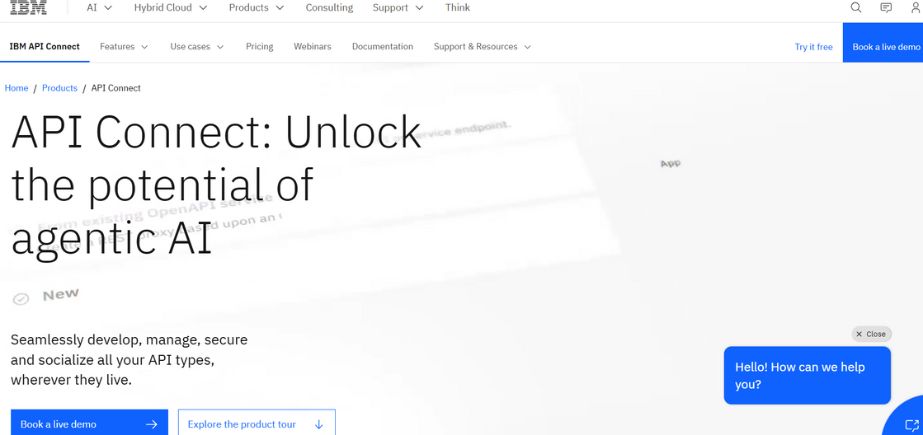
Type: Enterprise API management platform
Rating: 4.6/5
Website: https://www.ibm.com/products/api-connect
IBM API Connect provides a ready-to-enterprise API management solution that prioritizes governance and security over the API’s lifecycle. The platform takes a full lifecycle approach covering everything from API design through to retirement, and is especially good in version control and governance frameworks. About IBM’s solution, its strong point lies in the security implementation that combines several methods of authentication and defence from sophisticated threats, protecting the API endpoints from emerging threats.
The platform allows self-service capabilities in the form of developer portals, which expedites the process of finding, testing, and using APIs. IBM API Connect allows multi-cloud deployment while ensuring a consistent policy of governance, which is of great value for organizations that have complex needs for a hybrid infrastructure.
Key Features
- Multi-tier security framework
- Self-service developer portals
- Complete lifecycle management
- Version control system
- Cloud-agnostic deployment options
Pros
- Enterprise-grade security
- Excellent governance capabilities
- Comprehensive documentation resources
Cons
- Complex administration requirements
- Higher resource consumption
- Steeper learning curve
Pricing
Available as SaaS on AWS starting at $83/month
4. Jitterbit
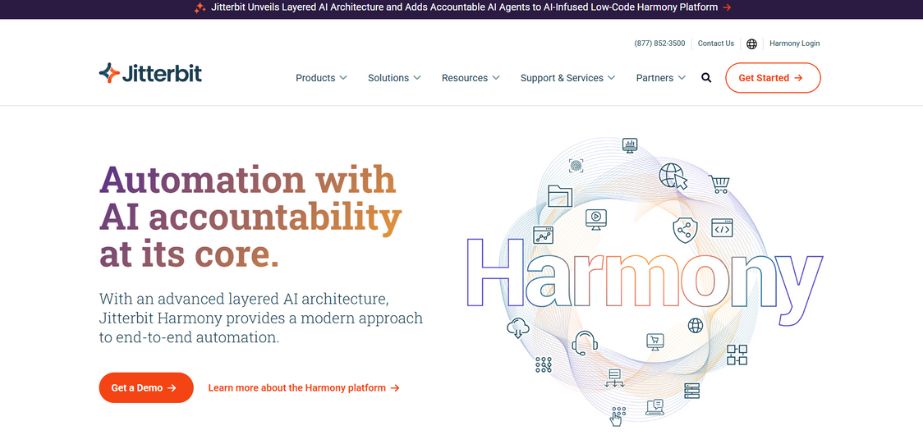
Type: Integration platform with API management capabilities
Rating: 4.6/5
Website: https://www.jitterbit.com
Jitterbit provides API management software that is easy to use, yet powerful. It is not at the cost of compromising functionality. The most outstanding feature of the platform is its intuitive graphical interface that enables even non-technical users be able to contribute to the API creation process through the use of point and click functionality. Jitterbit is the best in fast interface creation from existing data sources while losing little to no coding, and therefore suitable for businesses wishing to speed up their API programs with minimal developer talent.
The platform incorporates scalable enterprise API gateway features that guarantee a stable performance and security regardless of the rising use of API. Jitterbit’s strategy strikes a balance between simplicity and power, giving the solution that appeals to the fast creation of simple APIs and the provision of complex integration scenarios.
Key Features
- Point-and-click API creation
- Visual transformation tools
- Enterprise-scale gateways
- Simplified deployment workflows
- Comprehensive security controls
Pros
- Exceptional ease-of-use
- Rapid implementation timeline
- Strong integration capabilities
Cons
- Less customization depth
- Limited advanced features
- Fewer deployment options
Pricing
Three-tier structure (Standard, Professional, Enterprise) with custom pricing
5. Microsoft Azure API Management
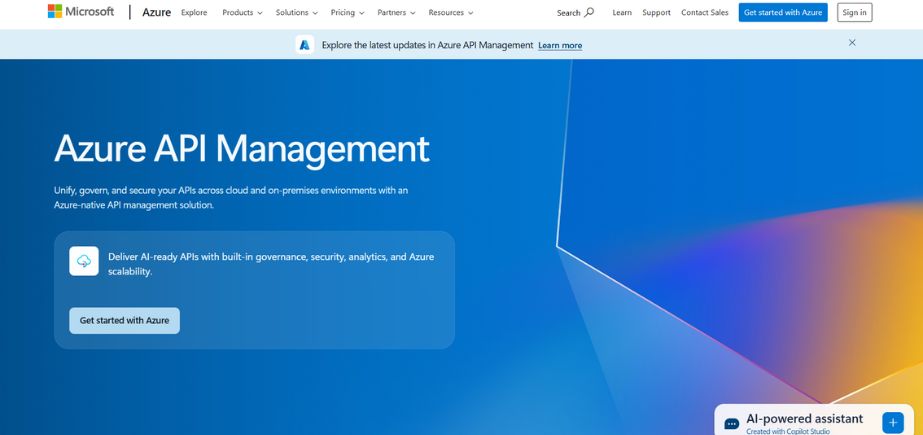
Type: Cloud-based API management service
Rating: 4.2/5
Website: https://azure.microsoft.com/en-us/services/api-management
Microsoft Azure API Management provides a fully managed API management solution that integrates easily into the Azure ecosystem and also provides a complete API lifecycle management solution. The strength of the platform is the transformation of legacy services to modern REST-based APIs, so that the organizations can modernize their application landscape without changing existing systems.
Azure API management provides a strong mechanism of security in terms of diverse authentication mechanisms and a granular authorization system for each API request. The platform enables real-time analytics that reveal useful details about usage patterns, performance metrics, and possible problems, and as such, the organisations can always keep optimising their API programs. For development teams, a simplified developer portal makes it easier to find, test, and deploy APIs.
Key Features
- Advanced authentication mechanisms
- Legacy service transformation
- Real-time analytics dashboard
- Streamlined developer portal
- Azure ecosystem integration
Pros
- Strong Microsoft ecosystem
- Excellent transformation capabilities
- Comprehensive security controls
Cons
- Azure-centric implementation
- Limited non-Microsoft integration
- Complex pricing structure
Pricing
Multiple tiers available (Developer, Basic, Standard, Premium, Isolated)
6. Workato
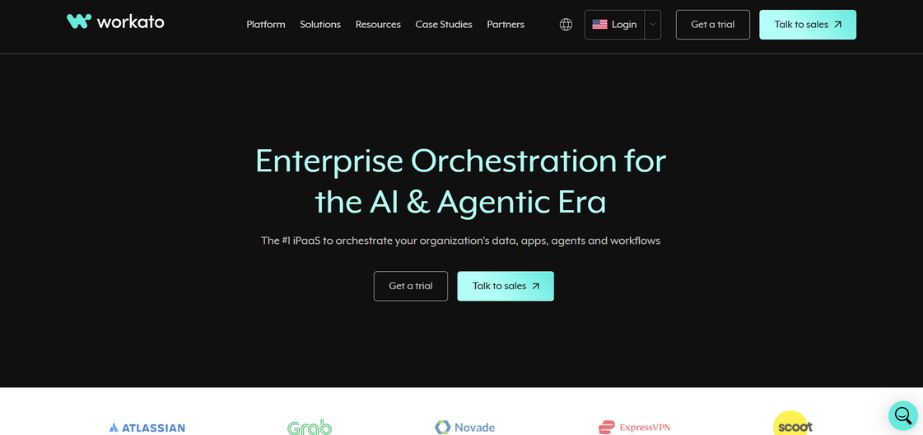
Type: Integration and automation platform with API management
Rating: 4.7/5
Website: https://www.workato.com
Workato can provide a holistic API management software solution with potent integration abilities and an intuitive user experience. The platform can handle the entire API lifecycle for both internal teams and external partners in a unified interface that easy the management processes. What makes Workato unique is the fact that it makes sophisticated API management available in an extremely user-friendly interface that lowers the level of technical knowledge needed for developing efficient API programs.
The platform has a full-featured API dashboard that allows organizations to observe any aspect of the API’s performance and use, to allow organizations to identify optimization opportunities much faster. The ability of Workato to customize APIs based on certain requirements without a lot of programming facilitates the balance between flexibility and ease of its implementations.
Key Features
- Full lifecycle management
- Comprehensive API dashboard
- Extensive customization options
- User-friendly interface design
- Partner management capabilities
Pros
- Exceptional user experience
- Rapid implementation process
- Comprehensive automation integration
Cons
- Less enterprise deployments
- Limited customization depth
- Undisclosed pricing structure
Pricing
Not publicly disclosed. Contact sales for a custom quotation
7. SAP Integration Suite
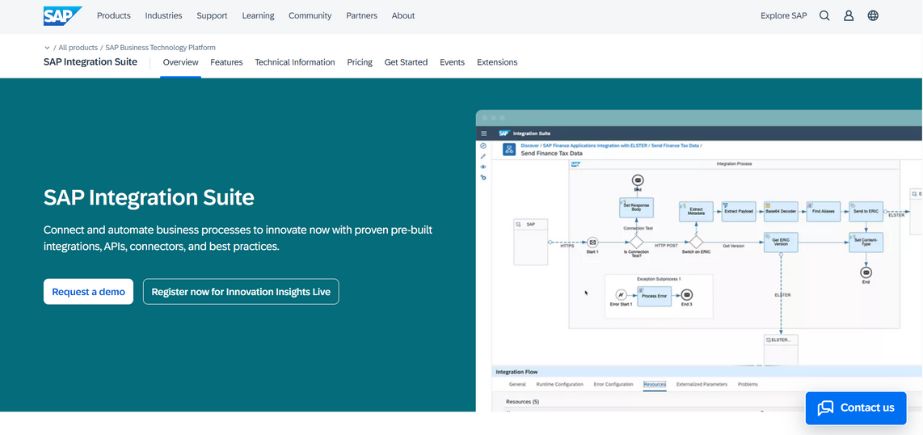
Type: Enterprise integration platform with API management
Rating: 4.3/5
Website: https://www.sap.com/products/integration-suite.html
SAP Integration Suite provides strong API management capabilities in the complete integration platform, catering to the enterprise needs. The solution specializes in connecting on-premise systems to cloud applications and governing consistently across hybrid environments. Something that sets SAP apart is the focus on real-time data processing and monitoring so that organizations can respond faster to the changing business situation.
The platform strictly follows the standards of the industry, such as OData and OpenAPI, so that it will be compatible with multiple systems and tools. Security elements are also very powerful, with a rich repertoire available for API authentication, authorization, and threat identification to safely protect the sensitive enterprise data, ensuring compliance with regulatory specifications.
Key Features
- Real-time processing framework
- Comprehensive security controls
- Standards-compliant implementations
- Advanced monitoring capabilities
- Hybrid connectivity options
Pros
- Exceptional SAP integration
- Strong enterprise compliance
- Real-time monitoring capabilities
Cons
- SAP-centric implementation
- Complex configuration requirements
- Higher resource consumption
Pricing
Standard plan at $4,150 per tenant/month.
8. Postman
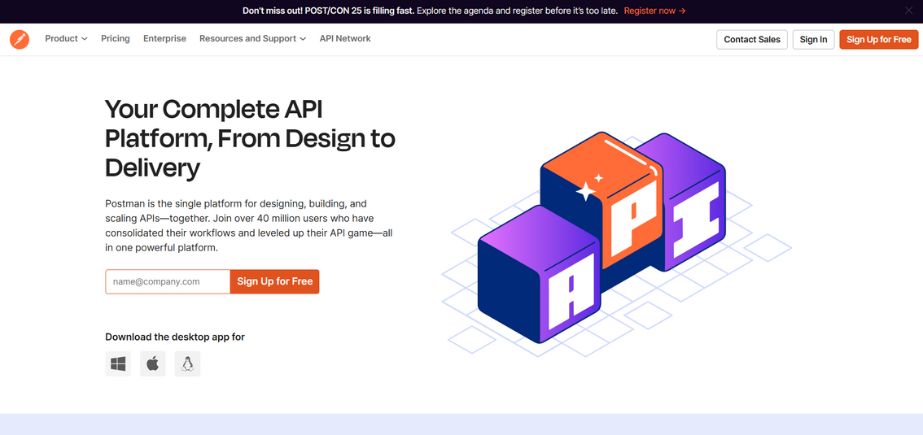
Type: API development and management platform
Rating: 4.6/5
Website: https://www.postman.com
This software has developed from being an API testing tool to a complete API management software that currently handles the API lifecycle. The uniqueness of the platform lies in the combination of development, testing, documentation, and management features in one environment simplifies the workflows of the API teams. Postman stands out in its capabilities to offer tools to support contemporary API development practices, such as automated testing, version control, and collaboration tools that boost the efficiency of a team.
The platform has strong documentation capabilities that automatically produce exhaustive API references from real implementations. Governance tools make the API manufacturing process consistent across distributed teams without compromising security standards during the API lifecycle. Postman’s widespread use in the developer community gives access to several resources and knowledge sharing.
Key Features
- Complete testing suite
- Automated documentation generation
- Comprehensive governance tools
- Built-in collaboration features
- Advanced security testing
Pros
- Exceptional developer experience
- Comprehensive testing capabilities
- Strong community support
Cons
- Less enterprise focus
- Limited integration options
- Gateway features are less robust
Pricing
Free plan available with limited features.
9. Apigee
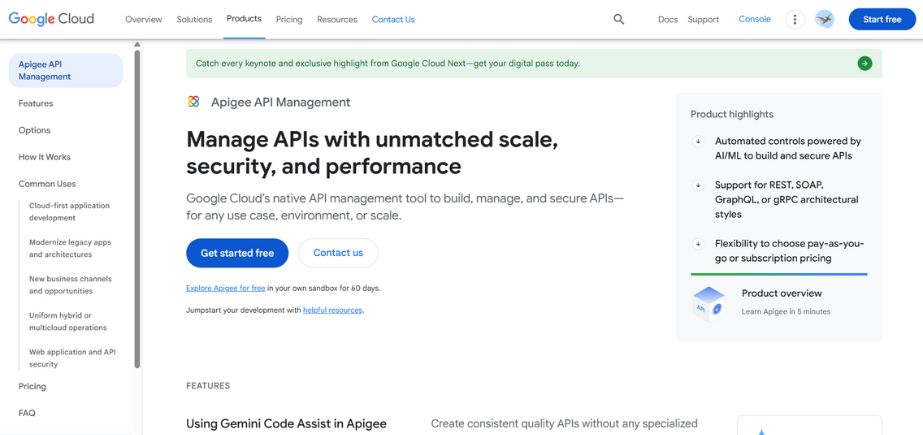
Type: Cloud-based API management platform
Rating: 4.4/5
Website: https://cloud.google.com/apigee
Apigee offers an enterprise-grade API management platform that has native integration with Google Cloud services, offering extraordinary scalability and security capabilities. The approach of the platform aims at allowing organizations to develop, control, and secure APIs in a consistent manner within difficult environments. Apigee is good at opening the data from various sources, while the use of standardized interfaces makes consumption easier for developers and applications. Security implementation is especially strong, featuring robust policies and controls to secure the API transactions from emerging threats. API monitoring and analytics capabilities in the platform provide actionable data on the behaviour of APIs and patterns of use, which allows organizations to fine-tune their API programs longitudinally. The architecture of Apigee provides flexible deployment options that accommodate traditional as well as modern application mannerisms.
Key Features
- Native Google Cloud integration
- Advanced security policies
- Comprehensive analytics dashboard
- Flexible deployment options
- Monetization capabilities
Pros
- Exceptional analytics capabilities
- Strong security implementation
- Excellent scalability characteristics
Cons
- Google Cloud preference
- Complex implementation process
- Steeper learning curve
Pricing
Available as pay-as-you-go or subscription-based pricing
10. SwaggerHub
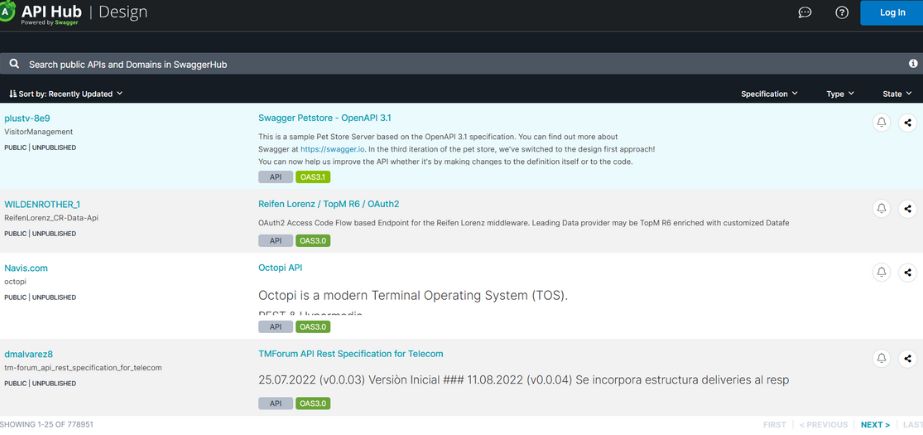
Type: API design and documentation platform
Rating: 4.5/5
Website: https://swagger.io/tools/swaggerhub
SwaggerHub provides API management software for specific strengths in standardized design and documentation of API. The platform’s focus is a powerful editor that requires the APIs to comply with the OpenAPI specification, making them consistent, well-documented, and easy to consume. SwaggerHub is outstanding in the area of centralization of API definitions and documentation in cloud-based storage, which is the only source of information for distributed development teams.
The platform has sophisticated versioning functionalities that ensure compatibility while allowing changes in APIs over time. Automation entities simplify the API lifecycle, i.e., from design to implementation, with updates that inform the stakeholders of the changes. SwaggerHub features integration opportunities with the most popular development tools and environments, allowing for seamless communication with a variety of development processes.
Key Features
- Standards-compliant editor
- Centralized API repository
- Advanced versioning system
- Automated workflow notifications
- Comprehensive integration options
Pros
- Excellent standards compliance
- Superior documentation capabilities
- Strong design-first approach
Cons
- More limited management
- Less runtime functionality
- Documentation-focused tooling
Pricing
A free plan is available for basic usage.
Read more blogs on AI Tools:
- Best AI Tools for Transcribing
- Best AI PDF Tools
- Best AI CRM Tools
- Best AI Content Writing Tools
- Best AI Web Scraping Tools
Tips for Choosing the API Management Software
- Requirements: Start the selection process by writing extensively regarding your specific needs of API management, current and future. Such an extensive evaluation should incorporate technical requirements such as the supported protocols and manner of authentication, organizational needs such as governance policies and compliance requirements, as well as business objectives such as monetization strategies and partner ecosystems that will make use of your APIs.
- Integration: Review how well the API management software easily integrates with your current technology topography, form legacy systems, cloud services, and development tools. The best solution would offer pre-built connectors for popular enterprise systems, standard protocol support, and ways to extend it, so that special cases of integration can be covered without deep custom development or hacks.
- Scalability: Evaluate the scalability of each platform with the demands of your business by knowing its architecture, performance benchmarks, as well as provision for deployment flexibility. Search for solutions that provide horizontal scaling, distributed gateway deployments with reduced latency for the global user base, and resource elasticity with no performance degradation and manual configuration during spikes of traffic.
- Usability: Imagine interaction with the platform by all stakeholders who will work with it – developers who will use APIs to get services, administrators taking care of the system, and business users looking at outcomes. The best solutions have intuitive interfaces that are customized to each type of user, extensive documentation and learning materials, and productivity-enhancing features such as code generation and test automation that facilitate implementation.
- Support: Assess the vendor’s support infrastructure, such as response time, the support channels, and access to technical experts in cases of an issue. Beyond reactive support, look at the accessibility of implementation aid, training programs, and professional services that have the potential to reduce your time-to-value in support of a team that can acquire the abilities to obtain the most out of the platform.
Conclusion
With the digital transformation efforts rewriting the business terrain in diverse industries, API management software has become an important part of the technology strategies of today. These platforms help organizations govern their expanding API environment, improve security posture, and promote innovation through access control on valuable digital assets. The right API management solution does not just eliminate the technical issues but also helps in achieving broader business goals in terms of enhancing developer experience, establishing new partnering models, and opening monetization opportunities.
The ten solutions analyzed here are various API management solutions, from dedicated tools covering particular aspects of the API lifecycle to all-around platforms addressing the entire set of management needs. When choosing which API management software is right for your organization, you need to match the solution’s capabilities to your primary needs, analyzing such factors as your existing technology landscape, development culture, security needs, and growth estimates.
Going deeper into 2025, we can also expect the evolution of API management platforms with more focus on AI-enabled analytics, automated security implementations, and streamlined governance structures that help to eliminate the complexity of managing distributed API ecosystems. Those companies that will put into practice efficient API management strategies right now will have more opportunities to benefit from these emerging capabilities, staying competitive due to the superior digital experiences and more agile business models.
By examining your needs and choosing the API management software that will help you to overcome your specific challenges, you can build a foundation for your long-term digital growth and innovation, which will provide benefits to your organization for years to come.
Frequently Asked Questions
What is the difference between an API gateway and API management software?
API gateway refers to a special component that deals with routing, protocol exchange, and basic security processing of the traffic of API, in the sense of being an entry point for API requests. In contrast, the API management software offers an all-encompassing solution that encompasses the gateway functionality, but continues to be a platform for the entire API lifecycle, with design tools, developer portals, analytics, monetization capabilities, and governance frameworks for instilling a consistent approach to distributed environments.
Can API management software help with legacy system integration?
Yes, up-to-date API management platforms tend to have the transformation capabilities that can make the legacy systems open for standardized APIs without changing the applications.
How does API management software handle security concerns?
API management solutions employ several security layers like authentication (confirmation of identity using schemes such as OAuth, API keys and JWT), authorization (access control based on identity and context), threat protection (protection against injection, scraping and DDoS attacks), encryption (security of data in transit) and audit logging (maintaining records of access attempts and administrative actions for compliance and troubles
Is cloud-based or on-premises API management better for enterprise needs?
The best deployment model is dependent on the situation-specific organizational requirements and is not a universal suggestion. Cloud-based solutions tend to have a faster implementation, less operational overhead, and elastic scaling, while on-premises deployments allow having more control of the infrastructure, locality of data, and the integration with internal systems.
How can organizations measure the ROI of implementing API management software?
There are direct metrics through which organizations can measure return on investment (ROI), such as reductions in development costs, generated new revenues as a result of API monetization, and lower support tickets, and indirect benefits (faster time-to-market for new services, improved developer productivity, and improved security posture).
